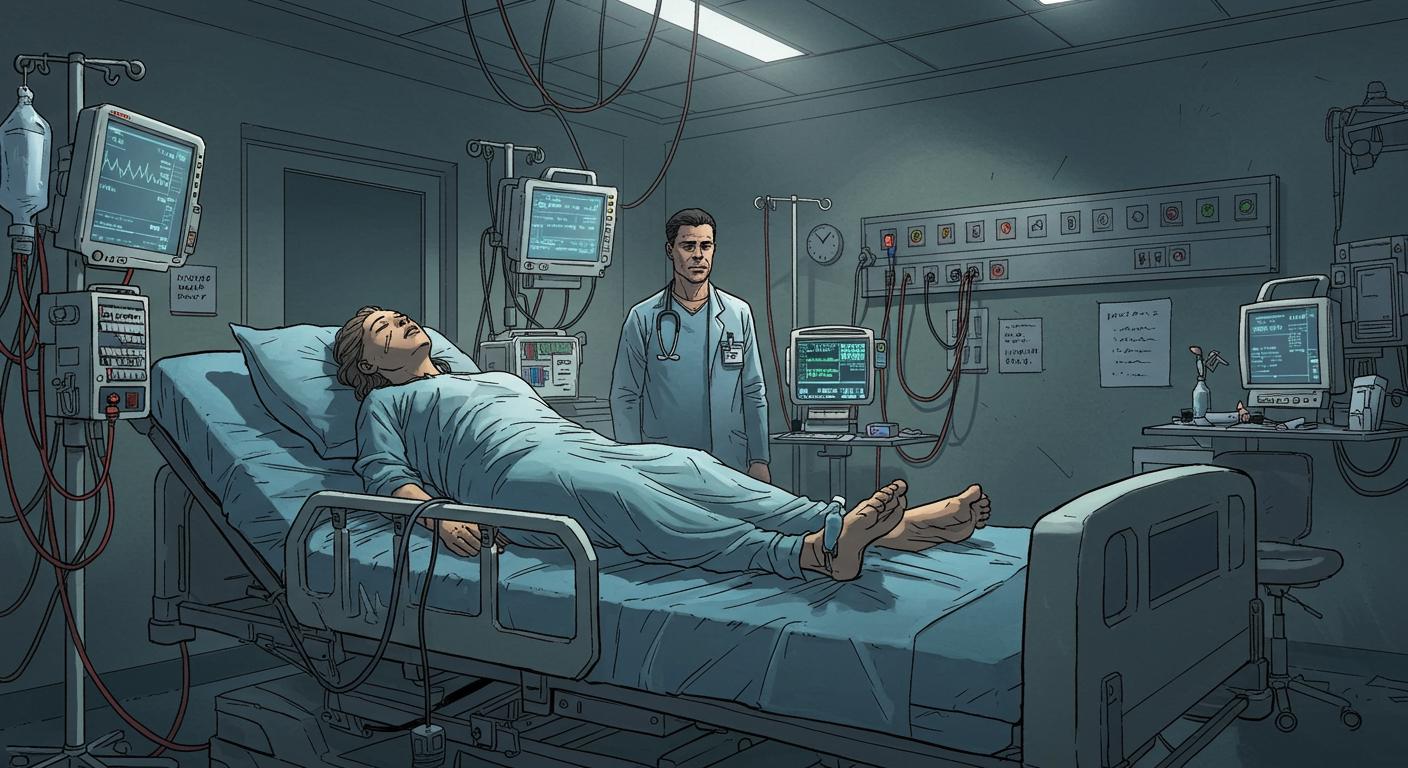Picture a mother—not a metaphorical one, but Adriana Smith, a 30-year-old nurse from Atlanta—lying in a hospital bed, her heartbeat present only due to machines, her body kept functioning by the unwavering diligence of hospital staff. As described in Newsweek, Smith is, by all medical accounts, no longer alive. Yet, because her body still carries a developing fetus, the law intervenes, demanding the continuation of life—at least, of a certain sort—even as the person herself is gone.
The Uncanny Middle Ground of Modern Medicine
Smith’s story unwinds in layers of misfortune and unintended consequences. As Newsweek reports, Smith was close to nine weeks pregnant when she began experiencing intense headaches in early February. Her mother, April Newkirk, recounted to 11Alive (WXIA-TV) and further summarized by Newsweek, that when Smith sought treatment at Northside Hospital, she was sent home with medication—no CT scan, no additional tests. “If they had done that or kept her overnight, they would have caught it. It could have been prevented,” Newkirk lamented.
The following day, Smith’s boyfriend awoke to her gasping for air, making noises he compared to gargling. He called 911, and Smith was admitted to Emory Decatur, then transferred to Emory University Hospital, as detailed in reporting by ABC10. There, a CT scan revealed multiple blood clots in her brain. Doctors initially planned a procedure to relieve the pressure, but as her mother told both outlets, “Then they called me back and said they couldn’t do it.” Smith was declared brain dead soon after.
When Law Outpaces Medicine (and Mercy)
For more than 90 days, machines have artificially maintained Smith’s bodily functions. Her family, according to ABC10, has been keeping vigil—her young son visiting, believing his mother is only sleeping. April Newkirk described seeing her daughter “breathing through machines for more than 90 days,” adding simply, “It’s torture for me. I see my daughter breathing, but she’s not there. And her son—I bring him to see her.”
Doctors at Emory Midtown, where Smith was recently moved for its obstetric care, have reportedly explained to the family that state law leaves them no alternative. Both Newsweek and People recount that under Georgia’s LIFE Act—a six-week “heartbeat” abortion ban that took effect in 2022 following the overturning of Roe v. Wade—admitting doctors are legally obligated to maintain life support until the fetus is considered viable, typically at 32 weeks. As ABC10 documents, Smith is currently 21 weeks into her pregnancy, meaning several more weeks of intensive medical intervention are required simply to reach the statutory target.
The law, known formally as the Living Infants Fairness and Equality (LIFE) Act, restricts abortions once cardiac activity is detected except in cases of rape, incest, or a threat to the mother’s life. However, as detailed by People, Smith’s case occupies a peculiar legal gray zone: as she has been declared brain dead, she is not considered to be in medical danger herself, so the legal “emergency” exception does not apply. Per the family’s conversations with doctors, recounted by all three outlets, physicians are not even permitted to discuss other options—Smith’s body must be kept functioning until the fetus either survives or does not.
What Does “Choice” Mean When the Law Is Absolute?
Throughout this ordeal, Smith’s family has been left with increasing trauma and questions—about the mother’s fate, the baby’s chances, and their own autonomy as next of kin. As her mother told People, “I think every woman should have the right to make their own decision. And if not, then their partner or their parents.” The family does not even know whether they would have chosen to end Smith’s pregnancy, Newkirk emphasized, but the fact that the law denied them any choice at all has made the situation intensely more painful.
Medical uncertainty haunts the situation further. Both Newsweek and People note that doctors have detected an unknown amount of fluid on the fetus’s brain—a condition with potentially dire consequences. “She’s pregnant with my grandson. But he may be blind, may not be able to walk, may not survive once he’s born,” Newkirk explained in her conversation with ABC10. And as she added to Newsweek, “Now we’re left wondering what kind of life he’ll have—and we’re going to be the ones raising him.”
The financial and emotional burden is growing daily, ABC10 also reports, as mounting hospital bills accumulate alongside their grief. With weeks left before 32 weeks gestation, and no say in the matter, the family faces an indefinite, heart-wrenching vigil.
The Human Toll of Laws Written for Edge Cases
The nature of Smith’s predicament raises hard, perhaps unanswerable, ethical questions for lawmakers and families alike. As Newsweek outlines, Georgia’s LIFE Act was passed along partisan lines; Governor Brian Kemp, upon signing, declared, “We will not back down. We will always continue to fight for life.” But as this case demonstrates, the definition of “life” often resists tidy legal categories—what, exactly, is being preserved in this sterile, machine-moderated limbo?
Advocates for reproductive rights, such as Kwajelyn Jackson of the Feminist Women’s Health Center (quoted by Newsweek), argue that the law has wrought “devastating harms,” with Smith’s family’s situation as a stark example. As noted by People, in most other states (or under previous precedent), such decisions would likely have defaulted to the mother’s family or partner, particularly given Smith’s vegetative state and the fetus’s uncertain prognosis.
Meanwhile, the legal landscape in Georgia remains in flux; Newsweek recounts the ongoing court battles over the LIFE Act and its constitutionality. For families like Smith’s, however, the wheels of justice move far too slowly. Days blur together in the long shadow of unresolved legislation and hospital hallway lighting.
A System of Unanswerable Questions
There’s an archivist’s lesson worth invoking: Sometimes the gaps tell you as much as the records themselves. In the gap between medicine and law, between life and its technical facsimile, what are we really striving to protect—and at what cost? Is this, truly, the preservation of life, or just a new type of bureaucratic tragedy written by legislative pen?
Smith’s body is kept suspended in the service of a statute, her family excluded from decision-making that, in ordinary times, would be theirs alone. As each outlet brings into relief, the oddest—and perhaps most unsettling—detail of all is that everyone involved seems to be acting with the best intentions, but in the name of a rule no one can question or, apparently, override.
In this limbo, heartbeat has eclipsed all other measures of humanity. Is it enough? Or is it merely proof that laws, like machines, can sometimes sustain only the appearance of life, while the deeper reality slips quietly away?
Sometimes the oddest part of a story is that it is, in fact, real—messy, unresolved, and as uncomfortable as hospital lighting. In Smith’s case, the law insists on heartbeats, even when the rest of the story has long since flatlined.







